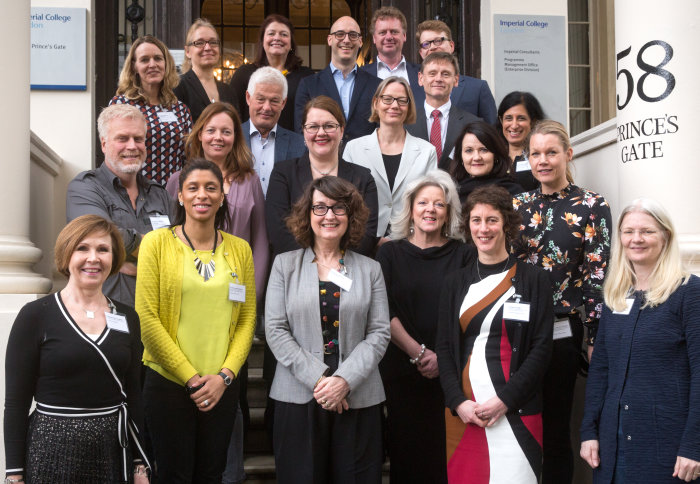European learning and teaching innovators meet at Imperial

Professor Simone Buitendijk alongside delegates
Education leaders from five research-intensive European universities gathered at Imperial.
The group are to form an innovation and learning hub, with the purpose of undertaking research into innovative new teaching and learning ideas. Over the course of two days education experts shared information on best practice and discussed potential areas for research collaboration.
In her opening remarks the College’s Vice-Provost for Education, Professor Simone Buitendijk, said: “We must all closely collaborate so that we can kick-start a greater amount and higher quality of education research. European institutions are doing well on an individual basis, however this process is more advanced among our North American colleagues.
“By regularly meeting and establishing collaborative research projects we will ensure that we are leading the way in evidence-based learning and teaching.”
The College’s Professor of Education, Martyn Kingsbury, continued: “It is key that we treat our students as partners in this process. Many of the questions we are seeking to answer can be solved by looking at students’ own learning experience.”
Sharing the knowledge
"We should also be considering improved educational outcomes as a societal ‘good’ – the right thing to do, not just for universities but for everyone.” Professor Dilly Fung University College London
Alongside colleagues from Imperial, representatives from Leiden University, University College London, University of Helsinki, and Utrecht University prepared presentations demonstrating their own approach to understanding best practice.
The day began with an introductory presentation on the College’s own Learning and Teaching Strategy. This is part of a plan to radically transform teaching at the UK’s most international and innovative university. By investing significantly in education the College is empowering students to solve challenges facing the world today and in the future. Staff and students will work together to focus on improving curriculum and assessment, learning and teaching, community and culture, and digital learning.
This discussion was followed by:
- Leiden University – Delegates discussed their Learning@Leiden strategy, which featured 8 ambitions that focussed on the ‘science of learning ’. The team from Leiden particularly emphasised that their plans are based on the feedback of students and faculty.
- University College London – Delegates highlighted their broad approach to encouraging faculty colleagues to consider learning and teaching improvements in their departments. In a number of case studies UCL representatives demonstrated their creative approach to education research.
- University of Helsinki – Delegates described the benefits of integrating technology with traditional student feedback, via a piece of software called ‘UniHow’. Compulsory use of the system by learners and teachers means that the university’s education team now have a much clearer idea of student learning abilities. Helsinki’s next step is to more closely track overall student wellbeing.
- Utrecht University – Delegates outlined the latest education research gathered from their institution’s admissions process. By analysing this data the team from Utrecht have had some success in solving consistently high student dropout rates within the first year of study.
Problem solving
Delegates were particularly keen to discover the opportunities and challenges encountered by each institution as they turned their strategies into action. The team from University of Helsinki attracted the biggest debate, with their UniHow software a popular topic for discussion.
 All delegates agreed on the goal of improving and expanding education research across their institutions, however the two day gathering encouraged many different viewpoints to be shared.
All delegates agreed on the goal of improving and expanding education research across their institutions, however the two day gathering encouraged many different viewpoints to be shared.
University College London’s Academic Director, Professor Dilly Fung, said: “Like many institutions the way we speak about transforming our learning and teaching often emphasises the technical benefits. While that is of course important, we should also be considering improved educational outcomes as a societal ‘good’ – the right thing to do, not just for universities but for everyone.”
Article text (excluding photos or graphics) © Imperial College London.
Photos and graphics subject to third party copyright used with permission or © Imperial College London.
Reporter
Murray MacKay
Communications Division